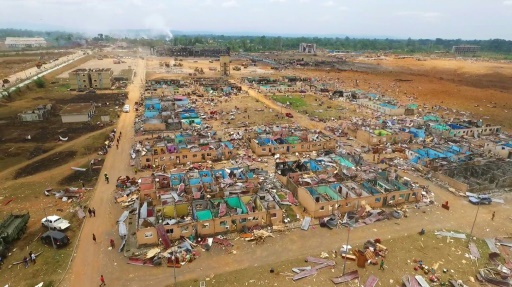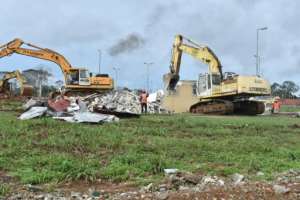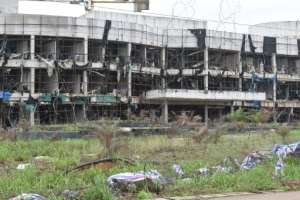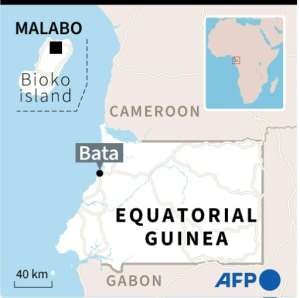
[ad_1]
On the afternoon of March 7, 2021, Sisto Asumu’s life was changed in an instant.
A huge explosion rocked a military camp just a hundred yards from the house where the 26-year-old lived with his uncle and aunt on the outskirts of Bata, the economic capital of Equatorial Guinea.
Stockpiles of explosives in the camp accidentally detonated, destroying neighboring residential areas, killing 107 people and injuring 615 others.
“I was sleeping and suddenly the roof collapsed on me,” Asumu recalls, grimacing. “Even thunder scares me now.
But like countless others who survived the blast, three weeks later, Asumu and her family are wondering how they’re going to tackle hunger and homelessness.
 Bulldozers are still cleaning up the wreckage almost three weeks later. By – (AFP)
Bulldozers are still cleaning up the wreckage almost three weeks later. By – (AFP) “We are sleeping in the church because our house is destroyed.”
Other victims seek refuge with relatives in other villages, stay with friends or crowd into makeshift shelters.
Everyone is hoping for some kind of help.
‘There was nothing left’
A chain of explosions reduced the military camp and its surroundings to rubble piles that stretch for kilometers (miles). Bulldozers are still cleaning up the wreckage almost three weeks later.
On empty land, the shells of wrecked cars are stacked on top of each other.
A team of US explosives experts is on hand to defuse any unexploded ordnance.
In the aftermath of the disaster, President Teodoro Obiang Nguema, whose 42-year reign made him Africa’s longest-serving ruler, accused local farmers of letting stubble burning get out of hand, soldiers in the camp for “negligence” in the storage of explosives.
Soraya, 27, was staying in Nkoa Ntoma with her soldier husband and children when the explosion occurred.
“I don’t know what happened – I just heard ‘BOOM’, the roof fell and the walls collapsed,” she says.
“I didn’t even know where my three children were – other people took care of them and thank God none of them died.”
Although the official death toll of 107 does not specify the age, witnesses tell AFP that many children were among the victims.
Back in the ruins of her house, Soraya discovered that someone had stolen her savings.
“I had 190,000 CFA francs (285 euros),” she laments, “and there was nothing left”.
 A team of US explosives experts is on hand to defuse any unexploded ordnance. By – (AFP)
A team of US explosives experts is on hand to defuse any unexploded ordnance. By – (AFP) Bata is home to around 800,000 of the 1.4 million inhabitants of Equatorial Guinea, a state that enjoys oil and gas wealth but where most people live below the poverty line.
The government claims to have released 10 billion CFA francs – around 15 million euros – to help the victims.
“I was given 500,000 francs and a mattress,” says Florencia Mbang happily.
But many others have yet to see any sign of help, like Luisa Ada, 33.
“My name is not on the lists even though my neighborhood agent came to tag us, my six children and myself,” said the widow, “I had no help and my house is destroyed”.
‘And tomorrow?’
The government turned schools into temporary shelters for those whose homes were destroyed, but witnesses say they were poorly equipped and most empty.
 Map of Equatorial Guinea locating the economic center of the country Bata and the capital Malabo. By (AFP)
Map of Equatorial Guinea locating the economic center of the country Bata and the capital Malabo. By (AFP) Ultimately, it was the solidarity among family members – a hallmark of Equatorial Guinean culture – that the victims relied on, crowding into homes that are still in the city or returning to the city. more distant villages.
“I lost my two houses”, laments Teresa Nchama, 50, “I lived with my four grandsons”.
Joaquina Efua, 35, who makes a living selling lemons, is frustrated at having to take shelter with relatives.
“I had to go live with my sister-in-law,” sighs the young mother, six months pregnant with her fifth child.
“There are nine of us in a log house and only three bedrooms.”
It was also difficult to find food.
“I gave my children 500 CFA francs (around 75 euro cents) to buy rice, I bought donuts for 100 francs”, murmurs Efua, “I have barely 100 francs left. And yesterday the neighbor gave us two packets of pasta. And tomorrow? “
“Only God knows,” she said.
Source link